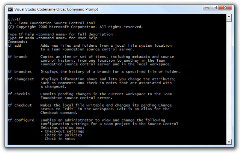 This morning we had a power cut which killed a particular tricky upgrade mid-way through trashing the machine I was attempting it on. Luckily the machine in question was a VM Ware image and I had recent taken a backup snap-shot so I only lost a few hours work.
This morning we had a power cut which killed a particular tricky upgrade mid-way through trashing the machine I was attempting it on. Luckily the machine in question was a VM Ware image and I had recent taken a backup snap-shot so I only lost a few hours work.
When the power returned I went out to the (now infamous) garage to switch on the machine I have running out there that acts as a VPN Gateway, TFS Proxy (the world's smallest) and Build Mirror which allows my network to seamlessly be part of the main Teamprise network.
However it would not boot. Being the technical minded English guy that I am, I unplugged the computer, went back inside and made myself a cup of tea in the hope that it would magically fix itself.
When I returned, I discovered that usually foolproof trick of simply ignoring the problem had let me down and it was going to be much messier than that. I brought the machine into my office, opened it up and instantly saw the problem - a set of rather sick looking capacitors on my motherboard.
At this point, I figured I was just going to have to get a new machine. Having recently got a fancy new workstation, I was not looking forward to breaking this news to my boss. I hopped onto the Internet to see what the cheapest machine I could get was when I discovered that this was a reasonably well known problem with my Dell SX270 motherboard, and better yet Dell was doing an out-of-warranty repair program to fix them.
I gave Dell a call fully expecting to get the brush off, but after about 5 minutes talking to 3 people around the globe, I got through to a chap who has arranged for an engineer to come to the office tomorrow and replace the motherboard - free of charge.
This is a much abused and unloved machine that has been running more-or-less 24 hours a day since I bought it several years ago. Just as it was about to go to the great landfill in the sky, it sounds like it is going to get a new lease of life. Sounds to good to be true - I'll let you know how the appointment with the Dell Engineer goes tomorrow.

 If the recent announcements about Silverlight have your interest and you can get to Dublin on June 7th this year then I would urge you to take a look at this years
If the recent announcements about Silverlight have your interest and you can get to Dublin on June 7th this year then I would urge you to take a look at this years 
